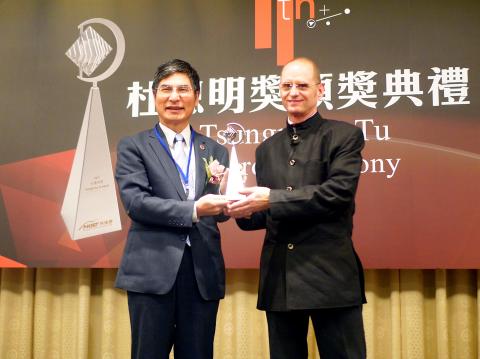Minister of Science and Technology Chen Liang-gee (陳良基) yesterday presented German plant molecular biologist Wolf Frommer with the 11th Tsungming Tu Award, the nation’s highest academic honor for foreign researchers, at a ceremony at Academia Sinica in Taipei.
The award — named after Tu Tsung-ming (杜聰明) — who in 1922 became the first Taiwanese to earn a doctorate and later founded Kaohsiung Medical University — was established in 2006.
Frommer, who was recommended by Academia Sinica’s Agricultural Biotechnology Research Center, is the sole winner this year.

Photo: Chien Hui-ju, Taipei Times
Winners of the award receive US$75,000, the ministry said, noting that 16 German academics have received the award since 2007.
Frommer previously served as an adviser to Academia Sinica’s Institute of Plant and Microbial Biology, and it expects to continue to collaborate with him, Academia Sinica Vice President Liu Fu-tong (劉扶東) said.
The 60-year-old Frommer, a member of Leopoldina, the German National Academy of Science, and a professor at Stanford University since 2003, is best known for his discovery of the so-called SWEET proteins that are related to sugar transportation in plant cells and his studies on fluorescent biosensors.
He returned to Germany in April last year to take up an Alexander von Humbolt professorship at Heinrich Heine University Dusseldorf, where he heads the Institute of Molecular Physiology.
In his speech at the ceremony, Frommer discussed water and food shortages around the world.
While such shortages are aggravated by climate change, it is “weird” that some people, especially in the US, say there is no such thing as climate change, he said, flashing a photograph of US President Donald Trump during his slide presentation.
To remedy food shortages and boost agricultural production, governments should allocate more funding to fundamental research on plant biology and promote “rational” engineering, he said.

The Mainland Affairs Council (MAC) today condemned the Chinese Communist Party (CCP) after the Czech officials confirmed that Chinese agents had surveilled Vice President Hsiao Bi-khim (蕭美琴) during her visit to Prague in March last year. Czech Military Intelligence director Petr Bartovsky yesterday said that Chinese operatives had attempted to create the conditions to carry out a demonstrative incident involving Hsiao, going as far as to plan a collision with her car. Hsiao was vice president-elect at the time. The MAC said that it has requested an explanation and demanded a public apology from Beijing. The CCP has repeatedly ignored the desires

Many Chinese spouses required to submit proof of having renounced their Chinese household registration have either completed the process or provided affidavits ahead of the June 30 deadline, the Mainland Affairs Council (MAC) said on Thursday. Of the 12,146 people required to submit the proof, 5,534 had done so as of Wednesday, MAC deputy head and spokesperson Liang Wen-chieh (梁文傑) said. Another 2,572 people who met conditions for exemption or deferral from submitting proof of deregistration — such as those with serious illnesses or injuries — have submitted affidavits instead, he said. “As long as individuals are willing to cooperate with the legal

The Ma-anshan Nuclear Power Plant’s license has expired and it cannot simply be restarted, the Executive Yuan said today, ahead of national debates on the nuclear power referendum. The No. 2 reactor at the Ma-anshan Nuclear Power Plant in Pingtung County was disconnected from the nation’s power grid and completely shut down on May 17, the day its license expired. The government would prioritize people’s safety and conduct necessary evaluations and checks if there is a need to extend the service life of the reactor, Executive Yuan spokeswoman Michelle Lee (李慧芝) told a news conference. Lee said that the referendum would read: “Do

The Ministry of Environment yesterday held a seminar in Taipei for experts from Taiwan and Japan to exchange their experiences on the designs and development of public toilets. Japan Toilet Association chairman Kohei Yamamoto said that he was impressed with the eco-toilet set up at Daan Forest Park, adding that Japan still faces issues regarding public restrooms despite the progress it made over the past decades. For example, an all-gender toilet was set up in Kabukicho in Tokyo’s Shinjuku District several years ago, but it caused a public backlash and was rebuilt into traditional men’s and women’s toilets, he said. Japan Toilet Association